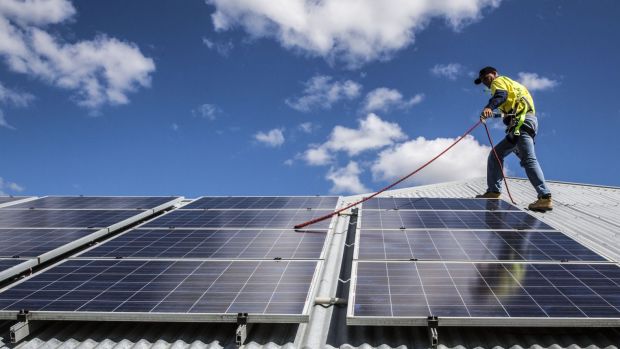The details came as the Greens announced a plan to double the number of paid firefighters to battle extreme bushfires, saying renewable energy is important but the effects of global warming are already being felt.
Fairfax Media polling this month showed two-thirds of voters believe the federal government is doing “not very much” or “nothing at all” to combat climate change, and Prime Minister Malcolm Turnbull’s adherence to policies of the former Abbott administration has been interpreted as a trigger for a fall in his popular appeal ahead of the July 2 election.
In Brisbane on Wednesday, Opposition Leader Bill Shorten spruiked a Labor plan to create up to 10 “community power hubs” to allow more people to access renewable energy. Labor previously flagged the measure in the release of its broader climate election policies in April.
He said the measure would help address climate change, lower household power bills and secure clean-energy jobs.
“There is no doubt that getting councils together, supporting people in social housing, ensuring pensioners are able to benefit from some of the benefits of renewable energy helps the bottom line for a lot of people battling to make ends meet,” Mr Shorten said.
“Only a Labor government … can be trusted to make sure we take real action on climate change, which is prioritising renewable energy at the centre of everything we do.”
As of February this year, more than 1.5 million Australian homes had rooftop solar panels. But Labor believes gaps exist among households unable to access the technology, such as renters, public housing tenants and apartment dwellers.
The community power hubs would work with communities to develop renewable projects by providing legal and technical expertise and start-up funding.
Projects might include community wind farms, “solar gardens” or shared arrays of solar panels for groups of renters, retrofitting social housing to promote energy efficiency and encouraging solar rooftop installations on social housing and aged-care properties.
The hubs may also provide finance for low-income earners and pensioners, such as by using council rates as financial contributions for projects.
Labor environment spokesman Mark Butler said the plan would allow more people to take part in the “solar revolution”.
Meantime, Greens climate change spokeswoman Senator Larissa Waters said her party’s $370 million plan to double firefighter numbers by 2030 would help protect Australians’ way of life in a warming world.
She unveiled the plan in Sydney on Wednesday alongside the party’s Grayndler candidate Jim Casey, a fire union boss who is challenging senior Labor Left MP Anthony Albanese for the seat.
“We must act on global warming by embracing clean energy as quickly as possible, but we’re already feeling severe impacts and we need to prepare and adapt in order to save lives and protect communities,” Senator Waters said.
Mr Casey said the federal government only funds about 1 per cent of national fire services and should do more.
“We must boost numbers of paid firefighters to share the increasing workload and provide firefighters with the equipment they need in order to do their all-important job of saving lives,” he said.
